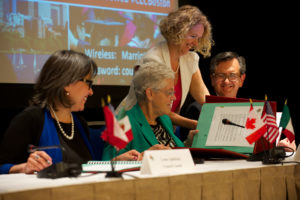Sunday, July 6, 2025
The Commission for Environmental Cooperation (CEC), established by Canada, Mexico and the United States through the North American Agreement on Environmental Cooperation, brings together a wide range of stakeholders to seek solutions for protecting North America’s shared environment while supporting sustainable development.
The newly ratified Environmental Cooperation Agreement (ECA) reflects a revitalized commitment for the CEC in setting and implementing an ambitious agenda. The capacity of the CEC Secretariat to deliver on this agenda requires strong and seasoned leadership.
The CEC recently appointed long-time CEC Secretariat professional Nathalie Daoust to the role of Director of Government Relations, Strategy and Performance. With more than 25 years of experience at the CEC, most recently as Council Liaison and Organizational Performance Officer, Daoust brings the right mix of institutional knowledge, strategic thinking and diplomatic skills to support the ECA at this challenging time.
In her new role, Daoust will play a critical part with the CEC team and will also be responsible for the adoption of a modernized performance management system as she helps develop programs and budgets that support an effective delivery of institutional priorities and objectives.
With this in mind, Environment Journal engaged Montreal, Quebec-based Daoust in an interview about her goals for her exciting new role with the CEC, and to find out what Canadians can expect in terms of upcoming initiatives.

Nathalie Daoust, the CEC’s Director of Government Relations, Strategy and Performance.
How has your educational and employment background, including your former role with the CEC Secretariat, informed your new position?
I have been at the CEC since the very first years of its inception; hence for 25 years. I have grown in this organization from being an administrative assistant to the position I now occupy. This is due to the good mentorship and inspiration of colleagues and exceptional leaders who have guided me and helped me advance within the organization.
Over those 25 years, I have also pursued my studies and completed both a Masters in Public Administration and a Masters in Law (with a focus on alternate dispute resolution/mediation). These have been instrumental in providing me with the knowledge and skills to accomplish my role as Senior Liaison with the governing body of the CEC, its Council. It is a role that requires a solid understanding of government functioning as well as strong management and diplomatic skills. My new role is more overarching in that it is more strategic in nature. The deep understanding of the CEC I have acquired has always brought me to the forefront of decision-making and problem-solving.
What is your motivating philosophy for your work in general and for this new role in particular?
It may sound cliché, but what motivates me is to feel that I am using my abilities to their fullest potential, and that my contribution is useful and appreciated. I try to apply the same logic for my employees so that they also feel fulfilled in their work. Being strategic is having the ability to consider rationally all factors at hand, while being intuitive about the right approach, what will be a win-win, and how we can communicate it. I have a lot of trust in building positive relationships. It gets you a long way when you have to present an idea or negotiate.

The CEC Secretariat’s Nathalie Daoust participating at a pre-pandemic council event.
What are your objectives and goals for this new position? Are there any specific changes you’re looking to implement?
As part of my new role, I am accountable for the implementation of a new Outreach and Partnership Strategy. It is the first time we are developing such a focused strategy, and I am excited that we are taking bold steps to build new and stronger partnerships. It is important that all sectors of society feel engaged and view themselves as stewards for the environment in North America. Partnerships with the private sector to leverage resource and develop win-win relationships, and with organizations to develop and transfer knowledge and best practices, are of particular interest to me in the coming years.
Under the new ECA, the CEC has been given a mandate to modernize and enhance cooperation between Canada, Mexico and the United States, building on their long history of cooperation. From a strategic perspective, I’m looking to make sure I support the parties in developing an ambitious work plan that supports the new agreement as well as the pillars of our 2021-2025 Strategic Plan. In addition, I want to make sure we are more effectively tracking and reporting on our performance in meeting these ambitious goals.
The new ECA reportedly has the strongest set of environmental provisions in a free trade agreement so far. This includes the new Chapter 24 which covers global environmental issues, such as illegal wildlife trade and logging, sustainable forestry and fisheries management, protection of the marine environment and the ozone layer, and conservation of species at risk and biological diversity. How effective has the CEC been so far in carrying out these new provisions?
The CEC has a long history of conserving, protecting and enhancing the environment by bringing the three countries together. To provide just a few examples, we have created action plans and provided training to enforcement officials to help conserve at-risk species, we have worked with scientists in the three countries to analyze the climate change mitigation potential of forest carbon and blue carbon, and worked tirelessly to engage communities in protecting migratory species like shorebirds and the monarch butterfly. We also operate platforms that provide free and open data on industrial pollutants, satellite imagery of North America and land cover change. For further examples, visit our impact and our long-term impact assessments.
In terms of Canada’s role in environmental cooperation, how can stakeholders in the environment industry maximize opportunities with the US and Mexico?
Put simply, engage with the CEC! Our Secretariat is based in Montreal, Canada and we regularly hold open trilateral forums on a wide array of environmental issues that are attended by key government, private sector, academia, NGO and other stakeholders across the three countries.
What are some notable trends you’re tracking in the global environmental industry?
Looking ahead, a major focus for us under our 2021-2025 Strategic Plan will be addressing marine litter and supporting circular economy policies and initiatives, two areas where the global environmental movement is trending in an overall shift towards more sustainable production and consumption patterns. In addition, recognizing the role of nature-based solutions as beneficial to fisheries, tourism and other economic activity will be a cross-cutting feature of all our work.
Connie Vitello is editor of environmentjournal.ca.











